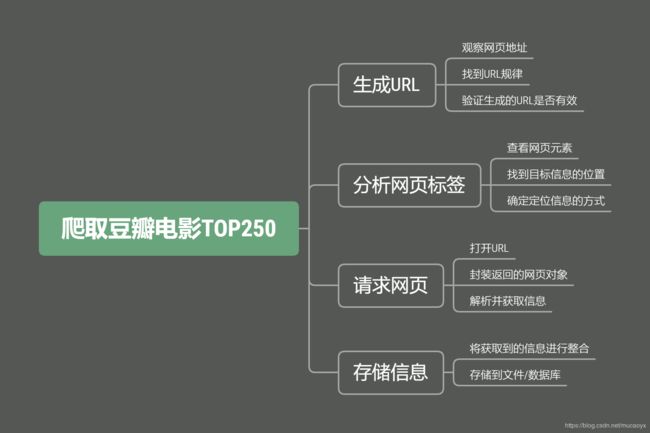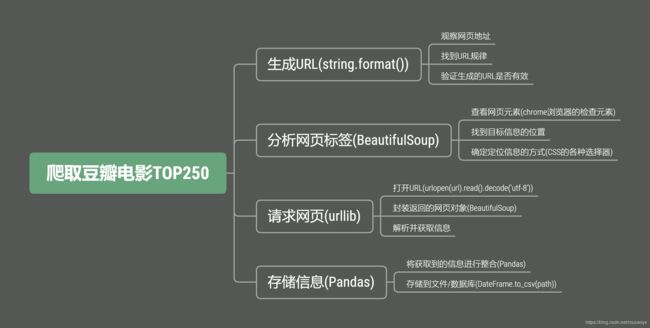零基础爬虫实战(Python):抓取豆瓣电影TOP250
学习了《简明Python教程》,然后想着实战一下,搜索了一些资料,然后对豆瓣电影排行250进行了一个抓取,后续还会对数据进行一些分析。
这篇文章主要是对抓取豆瓣电影top250过程的一个梳理,方便日后自己查阅,也希望可以方便到有需要的人。
一、整体步骤
1. 生成URL信息
首先观察豆瓣电影TOP250的网页地址,多点开几页,就能发现规律。每一页都是展示了25个电影。
2. 分析网页标签
这个就是对网页html文件的解析了,可以先在网页中浏览目标信息,然后在网页的源码中通过搜索查找到相应的标签。最后一定要搞清楚定位每一个目标信息标签的方式。
我在这是采用的是BeautifulSoup对html进行的解析。
3. 请求网页数据
我是使用urllib.request中的urlopen()方法对网页进行请求的。
urlopen(url).read().decode('utf-8')
urlopen(url)获取到的是HTTPResponse对象,然后调用read()方法获得网页的字节数据,字节数据没法直接处理,所以最后调用decode(‘utf-8’)方法将获取的字节对象编码成文本字符串(string)
4. 存储信息
先把数据生成pandas库的DataFrame对象,然后调用其to_csv()方法将数据存储到csv文件中,非常的方便。
二、完整的代码
算是自己完成了第一个小的爬虫程序,以后会在此基础上不断的扩展与完善。下面是获取豆瓣电影TOP250的Python完整代码。
# encoding=utf-8
from collections import defaultdict
from urllib.request import urlopen
from bs4 import BeautifulSoup
import pandas as pd
import time
import re
class DoubanMovieTop250:
# 生成url和相应存储最终数据的容器
def __init__(self):
self.top250_urls = ['https://movie.douban.com/top250?start={0}&filter='.format(i * 25) for i in range(10)]
self.data = defaultdict(list)
self.columns = ['title', 'link', 'score', 'score_cnt', 'top_no', 'directors', 'writers', 'actors', 'types',
'edit_location', 'language', 'dates', 'play_location', 'length', 'rating_per',
'betters', 'had_seen', 'want_see', 'tags', 'review', 'ask', 'discussion']
self.df=None
def get_info(self):
for url in self.top250_urls:
# 将获取的网页封装成BeautifulSoup
print(url)
html = urlopen(url).read().decode('utf-8')
bsobj = BeautifulSoup(html)
# 开始解析网页中的数据
main = bsobj.find('ol', {'class': 'grid_view'})
# 标题及链接信息
title_obj = main.findAll('div', {'class': 'hd'})
titles = [ i.find('span', {'class': 'title'}).text for i in title_obj]
links = [ i.find('a')['href'] for i in title_obj]
# 评分信息
score_obj = main.findAll('div', {'class': 'star'})
scores = [i.find('span', {'class': 'rating_num', 'property': 'v:average'}).text for i in score_obj]
score_cnts = [ i.findAll('span')[-1].text for i in score_obj]
# 将解析到的数据存入到容器中
for title, link, score, score_cnt in zip(titles, links, scores, score_cnts):
self.data[title].extend([title, link, score, score_cnt])
# 解析更多、更详细的信息
more_data = self.get_more_info(link)
self.data[title].extend(more_data)
print(self.data[title])
print(len(self.data))
time.sleep(1)
def get_more_info(self, link):
html = urlopen(link).read().decode('utf-8')
bsobj = BeautifulSoup(html)
# 榜单排名 top_no
top_no = bsobj.find('span', {'class': 'top250-no'}).text
# 导演 directors
main = bsobj.find('div', {'id': 'info'})
directors = [i.text for i in main.findAll('a', {'rel': 'v:directedBy'})]
# 编剧 writers 可能没有编剧
try:
writers = [i.text for i in main.findAll('span', {'class': 'attrs'})[1].findAll('a')]
except Exception as ex:
writers = []
print(ex)
# 主演 actors 可能没有主演
try:
actors_obj = main.findAll('a', {'rel': 'v:starring'})
actors = [i.text for i in actors_obj]
except Exception as ex:
actors = []
print(ex)
# 类型 types
types_obj = main.findAll('span', {'property': 'v:genre'})
types = [i.text for i in types_obj]
# 制片地区 edit_location
pattern = re.compile('地区:(.*)\n语言', re.S)
edit_location = re.findall(pattern, main.text)[0]
# 语言 language
pattern2 = re.compile('语言:(.*)\n上映日期', re.S)
language = re.findall(pattern2, main.text)[0]
# 上映日期和地区 dates play_location
date_boj = main.findAll('span', {'property': 'v:initialReleaseDate'})
dates = [i['content'].split('(')[0] for i in date_boj]
play_location = [i['content'].split('(')[1] for i in date_boj]
# 片长 length
length = main.find('span', {'property': 'v:runtime'})['content']
# 5星到1星的比例 rating_per 一共是5个数字
rating_per = [i.text for i in bsobj.findAll('span', {'class': 'rating_per'})]
# 好于 betters
better_obj = bsobj.find('div', {'class': 'rating_betterthan'}).findAll('a')
betters = [i.text for i in better_obj]
# 想看/看过 had_seen want_see
fit_obj = bsobj.find('div', {'class': 'subject-others-interests-ft'})
had_seen = fit_obj.find('a').text[:-3]
want_see = fit_obj.findAll('a')[1].text[:-3]
# 标签 tags
tags = [i.text for i in bsobj.find('div', {'class': 'tags-body'}).findAll('a')]
# 短评 review (有多少个短评)
review = bsobj.find('div', {'id': 'comments-section'}).find('h2').find('a').text
# 问题 ask (有多少个问题)
ask = bsobj.find('div', {'id': 'askmatrix'}).find('a').text.strip()
# 讨论 discussion (有多少个讨论)
discussion = bsobj.find('p', {'class': 'pl', 'align':'right'}).find('a').text.strip().split('(')[1][2:-2]
more_data=[top_no, directors, writers, actors, types, edit_location, language, dates, play_location, length, rating_per, betters, had_seen, want_see,tags, review, ask, discussion]
return more_data
# 存储数据到csv文件
def dump_data(self):
data = []
for title, value in self.data.items():
data.append(value)
self.df=pd.DataFrame(data, columns=self.columns)
self.df.to_csv('exercise_douban_movie_Top250.csv')
if __name__ == '__main__':
douban = DoubanMovieTop250()
douban.get_info()
douban.dump_data()
三、总结
在爬取信息之前,先到目标网页去浏览一下,首先分析网页地址的规律,然后分析目标信息在网页html文件中的位置,最后再编码实现,并存储抓取到的数据。
下面我把实现过程中用到的第三库和相关的函数都绘制到整体步骤的思维导图上,这样结合起来看,可以看的更清楚些。
在抓取数据的过程中,主要是用到了urllib请求网页数据,BeautifulSoup解析html信息,Pandas对数据进行了组织与存储。换句话说,只要掌握了urllib、BeautifulSoup、Pandas库的使用,就基本掌握了抓取网页数据。
参看资料:零基础Python爬虫实战:豆瓣电影TOP250

